List of national symbols: Difference between revisions
Jump to navigation
Jump to search
National Symbols: The Reboot |
Tag: 2017 source edit |
||
| (76 intermediate revisions by 14 users not shown) | |||
| Line 30: | Line 30: | ||
|- | |- | ||
|{{flag|Cartadania}} | |{{flag|Cartadania}} | ||
| | |{{wp|Orca}} | ||
| | |''{{wp|Orcinus orca}}'' | ||
| | |[[File:Orcinus Orca.jpg|250px|frameless]] | ||
|- | |- | ||
|{{flag| | |{{flag|Daxia}} | ||
|Badger | |Badger | ||
| | | | ||
| Line 50: | Line 50: | ||
|- | |- | ||
|{{flag|Metzetta}} | |{{flag|Metzetta}} | ||
| | |Alshar Moon Bear | ||
|''Ursus Alsharus'' | |||
|[[File:Asian Black Bear Ursus thibetanus by Dr. Raju Kasambe 05.jpg|250x250px]] | |||
|- | |||
|{{flag|Pelaxia}} | |||
|Jaguar | |||
|''Panthera onca'' | |||
|[[File:Onça do Pantanal.jpg|250px]] | |||
|- | |||
|{{flag|Castadilla}} | |||
|{{wp|Loggerhead sea turtle}} | |||
|''Caretta caretta'' | |||
|[[File:Loggerhead_turtle.jpg|250px]] | |||
|- | |||
|{{flag|Tierrador}} | |||
|[[w:Phoenix|Phoenix]] | |||
| | | | ||
| | | | ||
| Line 65: | Line 80: | ||
|- | |- | ||
|{{flag|Yonderre}} | |{{flag|Yonderre}} | ||
| | |[[Kossaque Fox]] | ||
| | |''Vulpes cosaci'' | ||
| | |[[File:Vulpes_corsac.jpg|250px]] | ||
|- | |||
|} | |} | ||
==National birds== | ==National birds== | ||
{| class="wikitable" | {| class="wikitable" | ||
| Line 82: | Line 99: | ||
| | | | ||
| | | | ||
| | |||
|- | |||
|{{Flagicon image|Austro-Caldera.png|size=25px}} [[Austro-Caldera]] | |||
|Calderan Finch | |||
|Porphyrospiza caerulescens | |||
|[[File:Porphyrospiza_caerulescens_-_Blue_Finch_(male).JPG|250px|frameless]] | |||
| | | | ||
|- | |- | ||
|{{flag|Burgundie}} | |{{flag|Burgundie}} | ||
|Kingfisher | |{{wpl|Common Kingfisher}} [[Burgoignesc language|Burg]]: Blauet ordinaire | ||
| | |Alcedo atthis | ||
| | |[[File%3A%E2%99%82_Common_Kingfisher_(Alcedo_atthis)_Photograph_By_Shantanu_Kuveskar%2C_Mangaon%2C_Maharashtra%2C_India.jpg|250px|frameless]] | ||
| | |Noted for being viciously territorial, even against it's young, the Common Kingfisher was often used in the [[Holy Levantine Emipre|HLE]] as an allegory for the coastal urbanites of the [[Kingdom of Dericania]]. The concept of overseas trade was lost on the landed ignoramuses of the "inner kingdom". They could only comprehend the practice based on what they obversed in every day life, and the expelling of offspring by the Common Kingfisher seemed to match the pattern witnessed in the coastal towns and cities. | ||
When the coastal states were united under the banner of [[Burgundie]] the slanderous connotation had faded and the proud nature and vicious defense of it's territory favored the national narrative of the formation of the new nation it became the national bird. The blue on the badge of the flags of [[Burgundie]] is a formulation owned by the [[Government of Burgundie|government]] and is called Bleue della Blauet. | |||
|- | |- | ||
|{{flag|Caphiria}} | |{{flag|Caphiria}} | ||
| Line 103: | Line 128: | ||
|- | |- | ||
|{{flag|Cartadania}} | |{{flag|Cartadania}} | ||
|Harpy | |{{wp|Harpy eagle}} | ||
| | |''Harpia harpyja'' | ||
| | |[[File:Harpia chega ao ninho com um macaco-prego.jpg|250px|frameless]] | ||
| | | | ||
|- | |- | ||
|{{flag| | |{{flag|Daxia}} | ||
|Giswi | |Giswi | ||
| | | | ||
| Line 127: | Line 152: | ||
|- | |- | ||
|{{flag|Kiravia}} | |{{flag|Kiravia}} | ||
| | |Storm Petrel | ||
Storm Petrel | |''Oceanites oceanicus'' | ||
| | |[[File:Wilson's Storm-petrel 0A2A7191.jpg|200x200px]] | ||
| | |||
| | | | ||
|- | |- | ||
| Line 137: | Line 161: | ||
|''Pica Serica'' | |''Pica Serica'' | ||
| [[File:Korean magpie in Daejeon.jpg|200x200px]] | | [[File:Korean magpie in Daejeon.jpg|200x200px]] | ||
| | |In Metzetta, the magpie (까치, "kkachi") is celebrated as a bird of great fortune, of sturdy spirit and a provider of prosperity and development. In the same vein of bringing fortune and luck, Metzettan children were also taught that when you lose a tooth, to throw it on the roof singing a song for the magpie; the bird will hear your song and bring you a new tooth. | ||
|- | |||
|{{flag|Pelaxia}} | |||
|Sarpedonian Condor | |||
|''Vultur gryphus'' | |||
|[[File:Colca-condor-c03.jpg|200x200px]] | |||
|- | |||
|{{flag|Castadilla}} | |||
|{{wp|Scarlet macaw}} | |||
|''Ara macao'' | |||
|[[File:Scarlet_macaw_(Ara_macao_cyanopterus)_Copan.jpg|200x200px]] | |||
|- | |- | ||
|{{flag|Urcea}} | |{{flag|Urcea}} | ||
| Line 153: | Line 187: | ||
|- | |- | ||
|{{flag|Yonderre}} | |{{flag|Yonderre}} | ||
|[[Levantine kestrel]] | |||
|''Falco levare'' | |||
||[[file:Common_kestrel_falco_tinnunculus.jpg|200x200px]] | |||
|} | |||
==National fish== | |||
{| class="wikitable sortable" | |||
|- | |||
!Country | |||
!Name of animal | |||
!Scientific name | |||
!Picture | |||
!Notes | |||
|- | |||
|{{flag|Yonderre}} | |||
|[[Vandarch pike]] | |||
|''Esox vandarcensis'' | |||
|[[File:Esox_lucius_ZOO_1.jpg|200x200px]] | |||
| | | | ||
| | |- | ||
|} | |} | ||
==National founders== | ==National founders== | ||
| Line 168: | Line 217: | ||
| | | | ||
{{flag|Alstin}} | {{flag|Alstin}} | ||
|[[Alstanus Ryefield]] | |||
| | | | ||
| | |An Ænglish Noble who initiated and led an exodus of Protestants from the [[Holy Levantine Empire]] to the [[Alstinian Isles]] beginning in 1557 during the [[Great Confessional War]]. He founded the city of [[Alstin (City)|Alstin]] in 1559 as a Protesrant refuge before becoming its became the first [[Kingdom of Alstin|King]] in 1565, reigning until his disappearance in 1573. | ||
| | |||
|- | |- | ||
|{{flag|Burgundie}} | |{{flag|Burgundie}} | ||
| | |Julian Marcilius Corvus Bergendus | ||
| | |[[File:Ritratto di settimio severo, 193-203 dc ca.jpg|250px|frameless]] | ||
| | |The [[Latinic]] commander who conquered the Impaxi tribes of the [[Ile Burgundie]], laying the foundation for the dominance of what would become [[Culture in Burgundie|Burgoignesc culture]] in the region. | ||
|- | |- | ||
|{{flag|Caphiria}} | |{{flag|Caphiria}} | ||
| Line 193: | Line 242: | ||
| | | | ||
|- | |- | ||
|{{flag| | |{{flag|Daxia}} | ||
| | | | ||
| | | | ||
| Line 209: | Line 258: | ||
|- | |- | ||
|{{flag|Kiravia}} | |{{flag|Kiravia}} | ||
| | |Emperor [[Ĥ]] | ||
| | |[[File:Emperor Ĥ.png|214x214px]] | ||
| | |Anointed 19,600 years ago, Ĥ reigned for 3,000 years, had five testicles, and was his own grandfather. | ||
|- | |||
|{{flag|Lucrecia}} | |||
|[[Marcia Eròina di sa Reprùbica]] | |||
|[[File:Philipp_Veit_006.jpg|250px|frameless]] | |||
|Although not the founder of the [[Old Emeritan Republic]], it was Marcia Eròina di sa Reprùbica's actions that prevented the Old Republic from becoming a monarchy. The date when her heroism supposedly occurred has been celebrated as a national holiday in Lucrecia ever since. | |||
|- | |- | ||
|{{flag|Metzetta}} | |{{flag|Metzetta}} | ||
| Line 217: | Line 271: | ||
| [[File:Yang-jo.jpg|214x214px]] | | [[File:Yang-jo.jpg|214x214px]] | ||
|A legendary figure whose exploits are detailed in the [[Iyagi-seda]], said to have reigned for 55 years from 2333 BC to 2278 BC as [[Metzetta|Metzetta's]] first [[Emperor of Metzetta|Emperor]]. | |A legendary figure whose exploits are detailed in the [[Iyagi-seda]], said to have reigned for 55 years from 2333 BC to 2278 BC as [[Metzetta|Metzetta's]] first [[Emperor of Metzetta|Emperor]]. | ||
|- | |||
|{{flag|Castadilla}} | |||
|[[Mauricio Delepas]] | |||
|[[File:Portrait_of_a_Man,_Said_to_be_Christopher_Columbus.jpg|250px|frameless]] | |||
|Mauricio Delepas was an [[Isurians|Isurian]] captain whose voyage in 1497 established the [[Viceroyalty of Los Rumas]], the first Occidental colony in [[Vallos]]. | |||
|- | |||
|{{flag|Tierrador}} | |||
|[[Aonaali Empire]] | |||
| | |||
|In Tierradorian mythology, the Aonaali Empire ruled the lands of modern-day Tierrador for close to 10,000 years, being the most technologically advanced civilization in history, until their mysterious disappearance around 2500 BC, leaving the land uninhabited until the indigenous migrations and the rise of the Abio Empire a little over 600 years later. The existence of many ruined structures with unusual characteristics prompt theories of the Aonaal's existence. | |||
|- | |- | ||
|{{flag|Urcea}} | |{{flag|Urcea}} | ||
| Line 229: | Line 293: | ||
|- | |- | ||
|{{flag|Yonderre}} | |{{flag|Yonderre}} | ||
| | |[[Joanus de Martigueux]] | ||
| | |[[File:Joanus.png|214x214px]] | ||
| | |Joanus de Martigueux (1436-1502) was the founder and first [[Grand Duke of Yonderre|Grand Count of Yonderre]] from 1464 (de facto, 1494 de jure) until his death in 1502. de Martigueux's crusaders [[Conquest of Joanusterra|conquered East Gothica]] between 1458-1474. | ||
|} | |} | ||
==National flowers/plants == | ==National flowers/plants == | ||
{| class="wikitable" | {| class="wikitable" | ||
| Line 246: | Line 311: | ||
| | | | ||
| | | | ||
|- | |||
|{{Flagicon image|Austro-Caldera.png|size=25px}} [[Austro-Caldera]] | |||
|Lady Slipper Orchid | |||
|[[File:Paphiopedilum_2.jpg|250px|frameless]] | |||
|- | |- | ||
|{{flag|Burgundie}} | |{{flag|Burgundie}} | ||
| Line 268: | Line 337: | ||
| | | | ||
|- | |- | ||
|{{flag| | |{{flag|Daxia}} | ||
| | | | ||
| | | | ||
| Line 285: | Line 354: | ||
|- | |- | ||
|{{flag|Kiravia}} | |{{flag|Kiravia}} | ||
| | |Supratemperate woodsorrel | ||
| | |[[File:Oxalis purpurea (Habitus) 2.jpg|200x200px]] | ||
| | | | ||
|- | |- | ||
| Line 293: | Line 362: | ||
|[[File:Magnolia flower Duke campus.jpg|200x200px]] | |[[File:Magnolia flower Duke campus.jpg|200x200px]] | ||
|A stylised magnolia blossom features as the central motif on Metzetta's flag. | |A stylised magnolia blossom features as the central motif on Metzetta's flag. | ||
|- | |||
|{{flag|Castadilla}} | |||
|{{wp|Common sunflower|Sunflower}} | |||
|[[File:Sunflower_sky_backdrop.jpg|214x214px]] | |||
| | |||
|- | |||
|{{flag|Tierrador}} | |||
|[[w:Orange blossom|Orange blossom]] | |||
| | |||
| | |||
|- | |- | ||
|{{flag|Urcea}} | |{{flag|Urcea}} | ||
| Line 305: | Line 384: | ||
|- | |- | ||
|{{flag|Yonderre}} | |{{flag|Yonderre}} | ||
| | |Carnation | ||
| | |[[File:W_carnation4051.jpg|200x200px]] | ||
| | | | ||
|} | |} | ||
==National trees== | ==National trees== | ||
{| class="wikitable" | {| class="wikitable" | ||
| Line 348: | Line 428: | ||
| | | | ||
|- | |- | ||
|{{flag| | |{{flag|Daxia}} | ||
| | | | ||
| | | | ||
| Line 367: | Line 447: | ||
|- | |- | ||
|{{flag|Kiravia}} | |{{flag|Kiravia}} | ||
| | |[[Metrea]]n Cypress | ||
| | |''Hesperocyparis metreana'' | ||
| | |[[File:Cupressus macrocarpa Pebblebeach.jpg|300x300px]] | ||
| | | | ||
|- | |- | ||
|{{flag|Metzetta}} | |{{flag|Metzetta}} | ||
|Neutinamu | |||
|''Zelkova serrata'' | |||
|[[File:Dangsan-namu-suhan-village-korea PML9647.jpg|300x300px]] | |||
|In Metzetta, ''Zelkova serrata'' has been considered a symbol of protection for villages since ancient times, and can still be found planted at central points in cities, towns and villages around the country. The trees often stand next to small pavilions, serving both as shaded informal gathering points, and spaces for traditional rituals and ceremonies involving prayer and offerings to the tree. The oldest of these trees are estimated to be in excess of 1,000 years in age, and are protected as natural monuments. In 2013, a project was announced by the [[Emperor's Gardens]] to clone the zelkova trees that are identified as natural monuments, so their lineage will not be lost in case of disaster or death due to age. | |||
|- | |||
|{{flag|Castadilla}} | |||
|{{wp|Manicaria|Troolie Palm}} | |||
|''Manicaria saccifera'' | |||
|[[File:Manicaria_saccifera.jpg|300x300px]] | |||
| | | | ||
|- | |||
|{{flag|Tierrador}} | |||
|[[w:Arecaceae|Terra Palm]] | |||
| | | | ||
| | | | ||
| Line 391: | Line 483: | ||
|- | |- | ||
|{{flag|Yonderre}} | |{{flag|Yonderre}} | ||
| | |Oak | ||
| | |''Quercus'' | ||
| | |[[File:Raunkiaer.jpg|250x250px]] | ||
| | | | ||
|} | |} | ||
==National dishes/foods== | ==National dishes/foods== | ||
{| class="wikitable" | {| class="wikitable" | ||
| Line 408: | Line 501: | ||
| | | | ||
| | | | ||
|- | |||
|{{Flagicon image|Austro-Caldera.png|size=25px}} [[Austro-Caldera]] | |||
|Bratwurst | |||
|[[File:Bratwurst_and_bread_roll_in_Hohenems.jpg|200x200px]] | |||
|While bratwurst is the official national dish, fish and rice is the most popular dish | |||
|- | |- | ||
|{{flag|Burgundie}} | |{{flag|Burgundie}} | ||
| Line 429: | Line 527: | ||
| | | | ||
|- | |- | ||
|{{flag| | |{{flag|Daxia}} | ||
| | | | ||
| | | | ||
| Line 451: | Line 549: | ||
|{{flag|Metzetta}} | |{{flag|Metzetta}} | ||
| | | | ||
| | |||
| | |||
|- | |||
|{{flag|Castadilla}} | |||
|[[Stella Santa]] | |||
|[[File:StellaSanta.png|200x200px]] | |||
|Created by a Yonderian chef in 1860, the Stella Santa is among the best-known foods in Castadilla. | |||
|- | |||
|{{flag|Tierrador}} | |||
|[[w:Pork ribs|Pork ribs]] | |||
| | | | ||
| | | | ||
| Line 465: | Line 573: | ||
|- | |- | ||
|{{flag|Yonderre}} | |{{flag|Yonderre}} | ||
| | |[[Yonderian pastry]] | ||
| | |[[File:Danish_pastry.JPG|200x200px]] | ||
| | | | ||
|} | |} | ||
==National fruits== | ==National fruits== | ||
{| class="wikitable" | {| class="wikitable" | ||
| Line 502: | Line 611: | ||
| | | | ||
|- | |- | ||
|{{flag| | |{{flag|Daxia}} | ||
| | | | ||
| | | | ||
| Line 523: | Line 632: | ||
|- | |- | ||
|{{flag|Metzetta}} | |{{flag|Metzetta}} | ||
|Plum | |||
|[[File:2015-365-207 Plums! Plums! (20042200642).jpg|200x200px]] | |||
| | |||
|- | |||
|{{flag|Castadilla}} | |||
|{{wp|Psidium cattleyanum|Red myrtles}} | |||
|[[File:Psidium_cattleianum_fruit.jpg|200x200px]] | |||
| | | | ||
|- | |||
|{{flag|Tierrador}} | |||
|[[w:Orange (fruit)|Orange]] | |||
| | | | ||
| | | | ||
| Line 542: | Line 661: | ||
| | | | ||
|} | |} | ||
==National drinks== | ==National drinks== | ||
{| class="wikitable" | {| class="wikitable" | ||
| Line 556: | Line 676: | ||
|- | |- | ||
|{{flag|Burgundie}} | |{{flag|Burgundie}} | ||
| | |[[Burgundie Wine Region|Burgoignesc wine]], and tea | ||
| | |[[File:Dyonisos Paphos mosaic.jpg|250px|frameless]] | ||
| | |[[Culture in Burgundie#Alcohol]], [[Caffeine Consumption in Burgundie]] | ||
|- | |- | ||
|{{flag|Caphiria}} | |{{flag|Caphiria}} | ||
| Line 575: | Line 695: | ||
| | | | ||
|- | |- | ||
|{{flag| | |{{flag|Daxia}} | ||
|[[Slozo]] | |[[Slozo]] | ||
| | |[[File:Kumys-bottle.jpg|250x250px]] | ||
| | |A mix of fermented donkey milk and ethanol | ||
|- | |- | ||
|{{flag|Faneria}} | |{{flag|Faneria}} | ||
| Line 596: | Line 716: | ||
|- | |- | ||
|{{flag|Metzetta}} | |{{flag|Metzetta}} | ||
|Soju | |||
|[[File:Soju.jpg|200x200px]] | |||
| | | | ||
|- | |||
|{{flag|Castadilla}} | |||
|{{wp|Piña colada}} | |||
|[[File:Piña_Colada.jpg|250px]] | |||
| | |||
|- | |||
|{{flag|Tierrador}} | |||
|[[w:Vodka|Vodka]] | |||
| | | | ||
| | | | ||
| Line 611: | Line 741: | ||
|- | |- | ||
|{{flag|Yonderre}} | |{{flag|Yonderre}} | ||
| | |[[Chevaleuer Verte]] | ||
| | |[[File:Schnapsglas_gr%C3%BCner_Chartreuse.jpg|250x250px]] | ||
| | |An herbal liqueur made since 1602 based on a recipe by [[Siegmar von Willing]] | ||
|} | |} | ||
==National sports== | ==National sports== | ||
{| class="wikitable" | {| class="wikitable" | ||
| Line 629: | Line 760: | ||
|- | |- | ||
|{{flag|Burgundie}} | |{{flag|Burgundie}} | ||
|Steeplechase | |[[Horse racing in Levantia|Steeplechase]], and {{wpl|Fleet racing}} | ||
| | |[[File:Steeplechase_(1257926029).jpg|250px|frameless]][[File:Fleet_Racing_with_Maltese_Falcon_in_the_background_(7070289697).jpg|250px|frameless]] | ||
| | |[[Horse_racing_in_Levantia#Burgundie]] | ||
|- | |- | ||
|{{flag|Caphiria}} | |{{flag|Caphiria}} | ||
| Line 648: | Line 779: | ||
| | | | ||
|- | |- | ||
|{{flag| | |{{flag|Daxia}} | ||
| | | | ||
| | | | ||
| Line 672: | Line 803: | ||
|[[File:Korea-2008 Gyeongju Citizens' Athletics Festival-Ssireum-01.jpg|200x200px]] | |[[File:Korea-2008 Gyeongju Citizens' Athletics Festival-Ssireum-01.jpg|200x200px]] | ||
|Ssireum is a traditional kind of wrestling which takes place in a sandy ring. | |Ssireum is a traditional kind of wrestling which takes place in a sandy ring. | ||
|- | |||
|{{flag|Tierrador}} | |||
|[[w:Association football|Association football]] (summer), [[w:Ice hockey|Ice hockey]] (winter) | |||
| | |||
| | |||
|- | |- | ||
|{{flag|Urcea}} | |{{flag|Urcea}} | ||
| Line 688: | Line 824: | ||
| | | | ||
|} | |} | ||
==National instrument== | ==National instrument== | ||
{| class="wikitable" | {| class="wikitable" | ||
| Line 697: | Line 834: | ||
|- | |- | ||
|{{flag|Alstin}} | |{{flag|Alstin}} | ||
| | |Guitar | ||
| style="border-color:inherit;" | | | style="border-color:inherit;" | | ||
| style="border-color:inherit;" | | | style="border-color:inherit;" | | ||
| Line 721: | Line 858: | ||
| style="border-color:inherit;" | | | style="border-color:inherit;" | | ||
|- | |- | ||
|{{flag| | |{{flag|Castadilla}} | ||
|{{wp|Classical guitar}} | |||
| style="border-color:inherit;" |<center>The {{wp|classical guitar}} was first invented in the 1850s in [[Rosaria]].<br>[[File:Trams.ogg]]</center> | |||
| style="border-color:inherit;" |[[File:136 Museu de la Música, guitarres.jpg|200x200px]] | |||
|- | |||
|{{flag|Daxia}} | |||
| | | | ||
| style="border-color:inherit;" | | | style="border-color:inherit;" | | ||
| Line 737: | Line 879: | ||
|- | |- | ||
|{{flag|Kiravia}} | |{{flag|Kiravia}} | ||
| | | {{wp|Mayonnaise}} | ||
| style="border-color:inherit;" | | | style="border-color:inherit;" |An {{wp|emulsion}} of oil, egg yolk, and an acid - either vinegar or lemon juice. | ||
| style="border-color:inherit;" | | | style="border-color:inherit;" |[[File:Mayonnaise (1).jpg|200x200px]] | ||
|- | |- | ||
|{{flag|Metzetta}} | |{{flag|Metzetta}} | ||
|Tanso | |Tanso | ||
| style="border-color:inherit;" |A traditional end-blown flute made from bamboo. | |||
| style="border-color:inherit;" |[[File:Danso.jpg|200x200px]] | |||
|- | |||
|{{flag|Tierrador}} | |||
| [[w:Mandolin|Mandolin]] | |||
| style="border-color:inherit;" | | |||
| style="border-color:inherit;" | | | style="border-color:inherit;" | | ||
|- | |- | ||
|{{flag|Urcea}} | |{{flag|Urcea}} | ||
| Line 761: | Line 908: | ||
| style="border-color:inherit;" | | | style="border-color:inherit;" | | ||
|} | |} | ||
==National personification== | ==National personification== | ||
{| class="wikitable" | {| class="wikitable" | ||
| Line 772: | Line 920: | ||
| | | | ||
| style="border-color:inherit;" |Alstinia | | style="border-color:inherit;" |Alstinia | ||
| style="border-color:inherit;" | | | style="border-color:inherit;" |Uncle Robert | ||
|- | |- | ||
|{{flag|Burgundie}} | |{{flag|Burgundie}} | ||
| | |[[File:Marin Estelle.png|250px|frameless]] | ||
| style="border-color:inherit;" | | | style="border-color:inherit;" |Marin-Estelle | ||
| style="border-color:inherit;" | | | style="border-color:inherit;" | [[Brother Auggie]] (satirical), <br>Common Kingfisher (historical and satirical) | ||
|- | |- | ||
|{{flag|Caphiria}} | |{{flag|Caphiria}} | ||
| Line 794: | Line 942: | ||
| style="border-color:inherit;" | | | style="border-color:inherit;" | | ||
|- | |- | ||
|{{flag| | |{{flag|Daxia}} | ||
| | | | ||
| style="border-color:inherit;" | | | style="border-color:inherit;" | | ||
| Line 813: | Line 961: | ||
| style="border-color:inherit;" | | | style="border-color:inherit;" | | ||
| style="border-color:inherit;" | | | style="border-color:inherit;" | | ||
|- | |||
|{{flag|Lucrecia}} | |||
|[[File:Rembrandt_van_Rijn,_Lucretia,_1664,_NGA_83.jpg|250px|frameless]] | |||
| style="border-color:inherit;" |{{wp|Lucretia}} | |||
| style="border-color:inherit;" |{{wp|Libertas}} (historical; [[Emeritan Republic]]),<br>{{wp|Saint Andrew}} (historical; [[Isurian Generality]]) | |||
|- | |- | ||
|{{flag|Metzetta}} | |{{flag|Metzetta}} | ||
| Line 818: | Line 971: | ||
| style="border-color:inherit;" | | | style="border-color:inherit;" | | ||
| style="border-color:inherit;" | | | style="border-color:inherit;" | | ||
|- | |||
|{{flag|Castadilla}} | |||
|[[File:Statue of the Republic (Triumph of the Republic), 2009-08-29 006.JPG|250px|frameless]] | |||
| style="border-color:inherit;" |[[Juana-Maria]] | |||
| style="border-color:inherit;" |{{wp|James the Great|Santiago}} (historical) | |||
|- | |- | ||
|{{flag|Urcea}} | |{{flag|Urcea}} | ||
| Line 830: | Line 988: | ||
|- | |- | ||
|{{flag|Yonderre}} | |{{flag|Yonderre}} | ||
| style="border-color:inherit;" |[[File:Green Knight.png|250px]] | |||
| style="border-color:inherit;" |The [[Green Knight]] | |||
| | | | ||
|} | |} | ||
==Other national symbols== | ==Other national symbols== | ||
{| class="wikitable" | {| class="wikitable" | ||
| Line 844: | Line 1,003: | ||
|- | |- | ||
|{{flag|Alstin}} | |{{flag|Alstin}} | ||
| | | Mineral | ||
| style="border-color:inherit;" | | | style="border-color:inherit;" | Jade | ||
| style="border-color:inherit;" | | | style="border-color:inherit;" | | ||
| | | | ||
| Line 873: | Line 1,032: | ||
| | | | ||
|- | |- | ||
|{{flag| | |{{flag|Daxia}} | ||
| | | | ||
| style="border-color:inherit;" | | | style="border-color:inherit;" | | ||
| Line 892: | Line 1,051: | ||
|- | |- | ||
|{{flag|Kiravia}} | |{{flag|Kiravia}} | ||
| | | Mineral | ||
| style="border-color:inherit;" | | | style="border-color:inherit;" | {{wp|Diopside}} with {{wp|asterism}} | ||
| style="border-color:inherit;" | | | style="border-color:inherit;" | [[File:Diopside cabochon Inde.jpg|200x200px]] | ||
| | | Dark green gemstone with a four-pointed asterism, resembling the Kiravian flag. | ||
|- | |- | ||
|{{flag|Metzetta}} | |{{flag|Metzetta}} | ||
| Line 916: | Line 1,075: | ||
|- | |- | ||
|{{flag|Yonderre}} | |{{flag|Yonderre}} | ||
| | |[[Paleontology in Yonderre|Dinosaur]] | ||
| style="border-color:inherit;" | | | style="border-color:inherit;" |''[[Joanusaurus]]'' | ||
| style="border-color:inherit;" | | | style="border-color:inherit;" |[[File:Allosaurus_SDNHM_(1).jpg|200px]] | ||
| | |Since 1932, theropod dinosaur named after [[Joanus de Martigueux]] | ||
|} | |} | ||
{{B.I.S NavBox}} | {{B.I.S NavBox}} | ||
[[Category:Bureau of International Statistics]] | [[Category:Bureau of International Statistics]] | ||
[[Category:IXWB]] | |||
[[Category:Culture]] | [[Category:Culture]] | ||
Latest revision as of 20:45, 30 October 2024
This list of national symbols is arranged alphabetically by country. Some national symbols are officially designated, some are unofficial. The following list is not exhaustive and many countries consider other items to be national symbols; the categories included here are recognised by almost every nation.
National animals
| Country | Name of animal | Scientific name | Picture |
|---|---|---|---|
| Kjeldoran Wolf | |||
| Leopard | |||
| Unicorn | |||
| Orca | Orcinus orca | 
| |
| Badger | |||
| Deamhainnin Timber Wolf | |||
| Alshar Moon Bear | Ursus Alsharus | 
| |
| Jaguar | Panthera onca | 
| |
| Loggerhead sea turtle | Caretta caretta | 
| |
| Phoenix | |||
| Lion | |||
| Wolf | |||
| Kossaque Fox | Vulpes cosaci | 
|
National birds
| Country | Bird name | Scientific name | Image | Notes |
|---|---|---|---|---|
| Alstinian Raven | ||||
| Calderan Finch | Porphyrospiza caerulescens | 
|
||
| Common Kingfisher Burg: Blauet ordinaire | Alcedo atthis | 
|
Noted for being viciously territorial, even against it's young, the Common Kingfisher was often used in the HLE as an allegory for the coastal urbanites of the Kingdom of Dericania. The concept of overseas trade was lost on the landed ignoramuses of the "inner kingdom". They could only comprehend the practice based on what they obversed in every day life, and the expelling of offspring by the Common Kingfisher seemed to match the pattern witnessed in the coastal towns and cities.
When the coastal states were united under the banner of Burgundie the slanderous connotation had faded and the proud nature and vicious defense of it's territory favored the national narrative of the formation of the new nation it became the national bird. The blue on the badge of the flags of Burgundie is a formulation owned by the government and is called Bleue della Blauet. | |
| Harpy eagle | Harpia harpyja | 
|
||
| Giswi | ||||
| Gallic Rooster | ||||
| Vandarch osprey | Pandion haliaetus | The osprey is a sacred bird in traditional Hendalarskara culture due to its close association with water and enjoys significant legal protections. | ||
| Storm Petrel | Oceanites oceanicus | 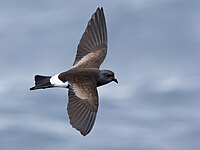
|
||
| Metzettan Magpie | Pica Serica | 
|
In Metzetta, the magpie (까치, "kkachi") is celebrated as a bird of great fortune, of sturdy spirit and a provider of prosperity and development. In the same vein of bringing fortune and luck, Metzettan children were also taught that when you lose a tooth, to throw it on the roof singing a song for the magpie; the bird will hear your song and bring you a new tooth. | |
| Sarpedonian Condor | Vultur gryphus | 
| ||
| Scarlet macaw | Ara macao | 
| ||
|
Golden Eagle |
||||
| Snowy Owl | ||||
| Levantine kestrel | Falco levare | 
|
National fish
| Country | Name of animal | Scientific name | Picture | Notes |
|---|---|---|---|---|
| Vandarch pike | Esox vandarcensis | 
|
National founders
| Country | Founding father(s) | Image | Notes |
|---|---|---|---|
| Alstanus Ryefield | An Ænglish Noble who initiated and led an exodus of Protestants from the Holy Levantine Empire to the Alstinian Isles beginning in 1557 during the Great Confessional War. He founded the city of Alstin in 1559 as a Protesrant refuge before becoming its became the first King in 1565, reigning until his disappearance in 1573. | ||
| Julian Marcilius Corvus Bergendus | 
|
The Latinic commander who conquered the Impaxi tribes of the Ile Burgundie, laying the foundation for the dominance of what would become Burgoignesc culture in the region. | |
| Emperor Ĥ | 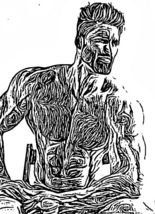
|
Anointed 19,600 years ago, Ĥ reigned for 3,000 years, had five testicles, and was his own grandfather. | |
| Marcia Eròina di sa Reprùbica | 
|
Although not the founder of the Old Emeritan Republic, it was Marcia Eròina di sa Reprùbica's actions that prevented the Old Republic from becoming a monarchy. The date when her heroism supposedly occurred has been celebrated as a national holiday in Lucrecia ever since. | |
| Yang-jo | 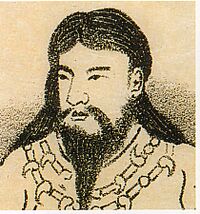
|
A legendary figure whose exploits are detailed in the Iyagi-seda, said to have reigned for 55 years from 2333 BC to 2278 BC as Metzetta's first Emperor. | |
| Mauricio Delepas | 
|
Mauricio Delepas was an Isurian captain whose voyage in 1497 established the Viceroyalty of Los Rumas, the first Occidental colony in Vallos. | |
| Aonaali Empire | In Tierradorian mythology, the Aonaali Empire ruled the lands of modern-day Tierrador for close to 10,000 years, being the most technologically advanced civilization in history, until their mysterious disappearance around 2500 BC, leaving the land uninhabited until the indigenous migrations and the rise of the Abio Empire a little over 600 years later. The existence of many ruined structures with unusual characteristics prompt theories of the Aonaal's existence. | ||
| Joanus de Martigueux | 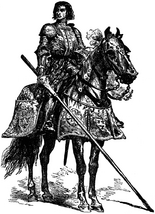
|
Joanus de Martigueux (1436-1502) was the founder and first Grand Count of Yonderre from 1464 (de facto, 1494 de jure) until his death in 1502. de Martigueux's crusaders conquered East Gothica between 1458-1474. |
National flowers/plants
| Country | Plant/flower name |
Image |
Notes |
|---|---|---|---|
| Rose | |||
| Lady Slipper Orchid | 
| ||
| Indigo | |||
| Thistle | |||
| Cherry Blossom | |||
| Hummingbird Fuschia | |||
| Supratemperate woodsorrel | 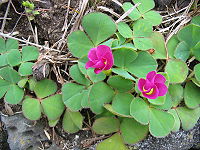
|
||
| Magnolia Blossom | 
|
A stylised magnolia blossom features as the central motif on Metzetta's flag. | |
| Sunflower | 
|
||
| Orange blossom | |||
| Edelweiss | |||
| Carnation | 
|
National trees
| Country | Tree name | Scentific name | Image | Notes |
|---|---|---|---|---|
| Oak | ||||
| Nipa Palm | ||||
| Mahogany | ||||
| Graybark Pine | ||||
| Metrean Cypress | Hesperocyparis metreana | 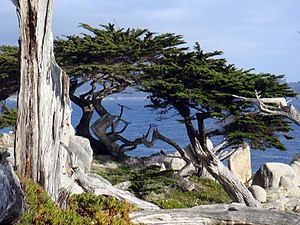
|
||
| Neutinamu | Zelkova serrata | 
|
In Metzetta, Zelkova serrata has been considered a symbol of protection for villages since ancient times, and can still be found planted at central points in cities, towns and villages around the country. The trees often stand next to small pavilions, serving both as shaded informal gathering points, and spaces for traditional rituals and ceremonies involving prayer and offerings to the tree. The oldest of these trees are estimated to be in excess of 1,000 years in age, and are protected as natural monuments. In 2013, a project was announced by the Emperor's Gardens to clone the zelkova trees that are identified as natural monuments, so their lineage will not be lost in case of disaster or death due to age. | |
| Troolie Palm | Manicaria saccifera | 
|
||
| Terra Palm | ||||
| Sycamore | ||||
| Silver Birch | ||||
| Oak | Quercus | 
|
National dishes/foods
| Country | Dish/food name | Image | Notes |
|---|---|---|---|
| Grilled Salmon | |||
| Bratwurst | 
|
While bratwurst is the official national dish, fish and rice is the most popular dish | |
| Quail | |||
| Haggis | |||
| Moqueca | |||
| Colcannon | |||
| Königsboden | High-grade Hendalarskara Riesling, paired with the caviar of the Vandarch sturgeon. | ||
| Potatoes | |||
| Stella Santa | 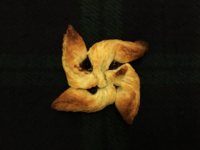
|
Created by a Yonderian chef in 1860, the Stella Santa is among the best-known foods in Castadilla. | |
| Pork ribs | |||
| Pulled Pork | |||
| Yonderian pastry | 
|
National fruits
| Country | Fruit name | Image | Notes |
|---|---|---|---|
| Apple | |||
| Pineapple | |||
| Plum | 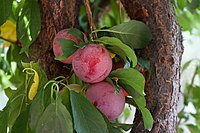
|
||
| Red myrtles | 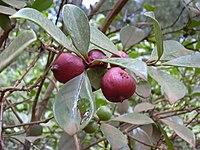
|
||
| Orange | |||
| Grape | |||
National drinks
| Country | Drink name | Image | Notes |
|---|---|---|---|
| Bourbon Whiskey | |||
| Burgoignesc wine, and tea | 
|
Culture in Burgundie#Alcohol, Caffeine Consumption in Burgundie | |
| Carnish Whiskey | |||
| Caipirinha | |||
| Slozo | 
|
A mix of fermented donkey milk and ethanol | |
| Jenwer | |||
| Soju | 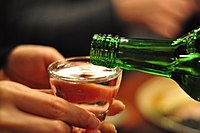
|
||
| Piña colada | 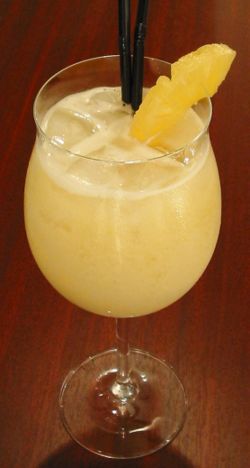
|
||
| Vodka | |||
| Goldwheat | |||
| Chevaleuer Verte | 
|
An herbal liqueur made since 1602 based on a recipe by Siegmar von Willing |
National sports
| Country | Sport | Image | Notes |
|---|---|---|---|
| Association football | |||
| Steeplechase, and Fleet racing | 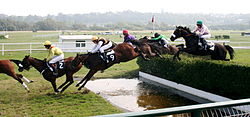 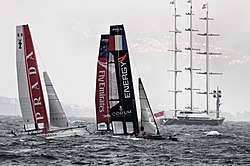
|
Horse_racing_in_Levantia#Burgundie | |
| Association football | |||
| Association football | |||
| Association football | |||
| Ssireum | 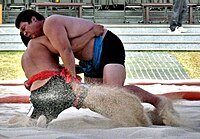
|
Ssireum is a traditional kind of wrestling which takes place in a sandy ring. | |
| Association football (summer), Ice hockey (winter) | |||
| Baseball | |||
| Ice Hockey | |||
National instrument
| Country | Instrument | Description Recording |
Image |
|---|---|---|---|
| Guitar | |||
| Classical guitar | 
| ||
| Mayonnaise | An emulsion of oil, egg yolk, and an acid - either vinegar or lemon juice. | 
| |
| Tanso | A traditional end-blown flute made from bamboo. | 
| |
| Mandolin | |||
National personification
| Country | Image | Personification | Animal/object used for the same purpose |
|---|---|---|---|
| Alstinia | Uncle Robert | ||
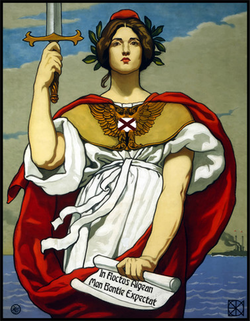
|
Marin-Estelle | Brother Auggie (satirical), Common Kingfisher (historical and satirical) | |
| Alexandria | |||

|
Lucretia | Libertas (historical; Emeritan Republic), Saint Andrew (historical; Isurian Generality) | |

|
Juana-Maria | Santiago (historical) | |
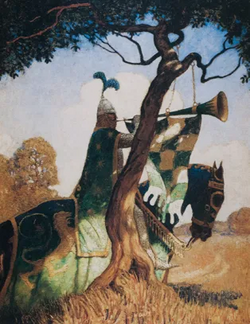
|
The Green Knight |
Other national symbols
| Country | Symbol type | Symbol name | Image | Notes |
|---|---|---|---|---|
| Mineral | Jade | |||
| Mineral | Diopside with asterism | 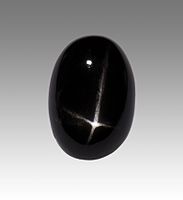
|
Dark green gemstone with a four-pointed asterism, resembling the Kiravian flag. | |
| Dinosaur | Joanusaurus | 
|
Since 1932, theropod dinosaur named after Joanus de Martigueux |